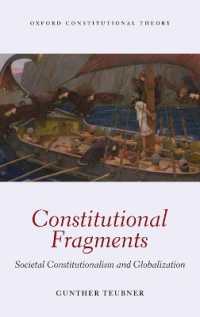- ホーム
- > 洋書
- > 英文書
- > History / World
Full Description
The culmination of West Indian decolonization came at a dangerous moment in the Cold War Caribbean, amid aftershocks of the Cuban Revolution, a wave of Third World nationalism abroad, and civil rights conflicts in the United States. Dozens of countries entered in the atlas in one generation, many of them through bloody clashes. Yet the West Indian passage to independence was peaceful and managed to avoid the heavy-handed American intervention seen elsewhere in the hemisphere, not to mention Vietnam and other parts of the globe. In this book, Jason Parker explains why a policy of American restraint was exercised in the British Caribbean (Jamaica and Trinidad and Tobago), despite the long association of West Indians with black radicalism in the United States.
This book closely examines the dynamics of the decolonization of the British West Indies from the 1930s to its Cold War culmination, particularly those surrounding the creation and subsequent implosion of the West Indies Federation. Washington had long sought anticommunist stability and access to strategic assets in the Caribbean. Yet the American ability to pursue these objectives was limited by British sovereignty and West Indian agency. The British wanted to end their responsibility for the colonies while retaining influence there. West Indian nationalists sought an urgent transition from white supremacy and imperial rule, drawing on a transnational "diaspora diplomacy" based in Harlem to do so. The resulting Anglo-American-Caribbean relations swung between the transatlantic special relationship and the trans-Caribbean "protean partnership" of formal and diasporan diplomacy. This study uses archives in six countries to write an international history of these relations. It integrates that history into the tableau of inter-American relations, and explores the relationship between the Cold War and decolonization. In the West Indies, the former first slowed and then accelerated the latter--a process which was already underway, and one whose effects reverberate throughout the Third World into the present day.
Contents
INTRODUCTION; CONCLUSION; NOTES; BIBLIOGRAPHY








